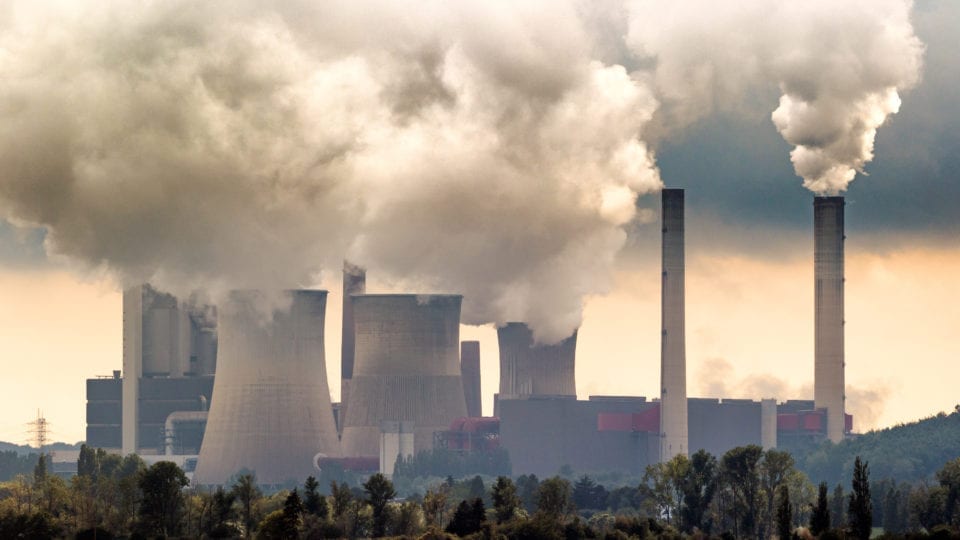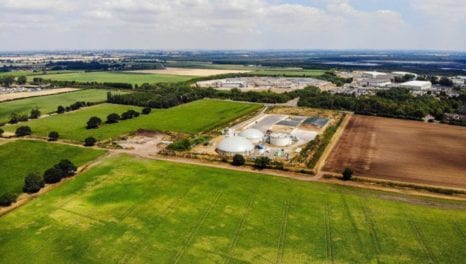Networks can help UK meet net zero emissions target
Energy networks will be at the heart of the Committee on Climate Change's (CCC) recommendations to move beyond an 80% target and deliver net zero emissions by 2050.
2nd May 2019 by Networks

That’s the view of the chief executive of the Energy Networks Association (ENA), an organisation that represents the electricity and gas transmission and distribution network operators in the UK and Ireland.
A major new report from the CCC says the UK must “set and vigorously pursue” a bold new climate change target to reduce greenhouse gas emissions to ‘net-zero’ levels by 2050 – replacing the current target of an 80% reduction against 1990 levels.
ENA chief executive David Smith said: “We back the CCC’s advice that to move beyond an 80% target and deliver net zero emissions by 2050, low-carbon hydrogen will be an absolute necessity within our energy system. We echo their calls for carbon, capture, usage and technology to be deployed at scale and quickly, as it is essential to the development of a hydrogen economy. Energy networks will be at the heart of this transition.
“There will be no silver bullet to reaching net zero, with energy networks leading innovation needed across major sectors of the economy including heating, power and transportation. Given the vital role that gas networks have to play in decarbonising heat, we believe the public should be allowed to benefit from new technologies such as smart hybrid heating systems and that new homes should continue to be connected to the gas grid. Already, homes right across the UK are receiving low-carbon green gas, with the Government committed to increasing this. To ensure the networks can help deliver this while keeping costs low for the public, our policy and regulatory framework must be closely aligned.”
The CCC says Scotland has greater potential to remove pollution from its economy than the UK overall, and can credibly adopt a more ambitious target of reaching net-zero greenhouse gas emissions (GHGs) by 2045.
Wales has slightly lower opportunities than the UK as a whole and should adopt a target for a 95% reduction in greenhouse gas emissions by 2050, compared to 1990 levels.
The CCC’s recommended targets, which cover all sectors of the UK, Scottish and Welsh economies, are achievable with known technologies, alongside improvements in people’s lives, and should be put into law as soon as possible, the Committee says.
The Committee’s report, requested by the UK, Scottish and Welsh Governments in light of the Paris Agreement and the IPCC’s Special Report in 2018, finds that:
- The foundations are in place throughout the UK and the policies required to deliver key pillars of a net-zero economy are already active or in development. These include: a supply of low-carbon electricity (which will need to quadruple by 2050), efficient buildings and low-carbon heating (required throughout the UK’s building stock), electric vehicles (which should be the only option from 2035 or earlier), developing carbon capture and storage technology and low-carbon hydrogen (which are a necessity not an option), stopping biodegradable waste going to landfill, phasing-out potent fluorinated gases, increasing tree planting, and measures to reduce emissions on farms. However, these policies must be urgently strengthened and must deliver tangible emissions reductions – current policy is not enough even for existing targets.
- Policies will have to ramp up significantly for a ‘net-zero’ emissions target to be credible, given that most sectors of the economy will need to cut their emissions to zero by 2050. The Committee’s conclusion that the UK can achieve a net-zero GHG target by 2050 and at acceptable cost is entirely contingent on the introduction without delay of clear, stable and well-designed policies across the emitting sectors of the economy. Government must set the direction and provide the urgency. The public will need to be engaged if the transition is to succeed. Serious plans are needed to clean up the UK’s heating systems, to deliver the infrastructure for carbon capture and storage technology and to drive transformational change in how we use our land.
- The overall costs of the transition to a net-zero economy are manageable but they must be fairly distributed. Rapid cost reductions in essential technologies such as offshore wind and batteries for electric vehicles mean that a net-zero greenhouse gas target can be met at an annual cost of up to 1-2% of GDP to 2050. However, the costs of the transition must be fair, and must be perceived as such by workers and energy bill payers. The Committee recommends that the Treasury reviews how the remaining costs of achieving net- zero can be managed in a fair way for consumers and businesses.
Lord Deben, Chairman of the Committee on Climate Change, said: “We can all see that the climate is changing and it needs a serious response. The great news is that it is not only possible for the UK to play its full part – we explain how in our new report – but it can be done within the cost envelope that Parliament has already accepted. The Government should accept the recommendations and set about making the changes needed to deliver them without delay.”
Industry reaction:
Chair of the National Infrastructure Commission Sir John Armitt said: “Today’s report highlights the importance of urgent, concerted action to protect the UK’s economy and environment from the impacts of climate change. Future generations won’t forgive us if we don’t act together and with a sharp focus.
“But to achieve net zero emissions by 2050, we must put in place the infrastructure we need to change how we travel and how we power and heat our homes and businesses.
“The key step is to ensure a rich mix of renewable energy sources. That’s why in the UK’s first National Infrastructure Assessment we called for at least 50% of our electricity to come from renewable sources by 2030, along with measures to speed up the delivery of lower carbon heating for our homes and the adoption of electric vehicles.
“It is essential that the government’s National Infrastructure Strategy, expected this autumn, sets out a robust and effective plan for funding and delivering these changes.”
Anna Turley, MP for Redcar and chair of the All Party Parliamentary Group (APPG) on Hydrogen, said: “It is great to see the CCC highlighting the huge potential for hydrogen technologies to significantly decrease carbon emissions from the way we heat our homes, power heavy industries and fuel cars, vans, trains, lorries and ferries.
“There are already some great projects taking place across the UK to develop our understanding of hydrogen, and we agree with the CCC that the Government needs to support these, as well as new initiatives, with the necessary funding, time and political will. We must build the evidence base required to make long-term decisions about the role of hydrogen in the UK’s future economy, and we need to do this quickly and at scale.
“If we get our policy decisions right, we have a major opportunity not just to reach our net zero ambitions, but to place the UK as a global leader in hydrogen technology, export our skills, services and products across the world and create thousands of high-quality, skilled jobs. This is incredibly important to places like Redcar and many other northern regions, and this is why I’ll be working hard to ensure the Government listens to its expert climate change advisers and steps up its support for hydrogen.”
Simon Daniel, CEO of Moixa, a leading smart battery company, said: “We welcome the acceleration of targets. The UK needs to move faster and lead the world as a low carbon economy. We need to deliver the best low carbon electricity grid, through smart charging of batteries and electric vehicles, to maximise solar and wind resources.
“With the current arguments over customs unions and trade approaches, the UK should seize the opportunity to pioneer low carbon trade and carbon taxes – as also advocated by Germany this week. We should shift the World Trade Organisation and the EU to a tariff regime that favours products made more locally with low carbon electricity grids and digital services. This as a policy would help deliver the Paris accord.”
Matt Allen, CEO of Pivot Power, energy storage developer, said: “Our 2.25GW energy storage network across 45 sites in the UK will drive widespread, devolved decarbonisation across the country by creating the essential flexibility required for more renewables on the system along with the essential power infrastructure for EV charging to accelerate the uptake of electrified transport.
As the country moves to establish net zero emissions targets, our message is simple – let’s bring every town, city and village with us in the clean growth revolution. Good for business and good for local communities in equal share, our plan will create access to low-carbon transport and jobs in the decarbonised economy for all members of society.”
You can read the thoughts of Ed Syson, chief safety and strategy officer at Cadent, in an exclusive blog here.
Comments
Login on register to comment
Related content

Gas
Cadent backs launch of major bio-CNG HGV refuelling station
Gas network’s £250,000 infrastructure investment ensures supplies to existing connected customers have not been impacted

Gas
Editor’s blog: The biggest tests of resilience are yet to come
Network content director Jane Gray reflects on the industry's coronavirus response to date and the challenges still to come.

Gas
From the front line: Chris Garside and Andy Simcoe, Northern Gas Networks
Key workers across the power and gas networks are playing a critical role in the national response to Coronavirus. Network has committed to profiling their stories.
Related supplier content

Power
Load patterns and lockdown: how Covid-19 is impacting electricity networks
Insights into dynamics on the low voltage network as the outbreak unfolds

Downloads
Protect electrical equipment from insulation failure
Insulation faults are a major cause leading to the eventual failure of electrical equipment. Partial discharge (PD) is a very reliable indicator of developing insulation faults. Regular PD testing allows users to detect and analyze PD activity

Heat
How E.ON. is helping the City of London become a zero emissions city
Discover Citigen. Deep in the heart of our bustling capital